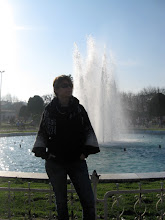So what? you may be asking. Or, What does this have to do with health?
Cars and air conditioning are among the technologies most people can't imagine getting along without, but I would make the claim that for most people, for most of the time, we need to try. These technologies separate us, isolate us. When we drive in and out of our neighborhood, we have no idea who our neighbors are. When we walk up and down our street, to the bus, the store, the post office, we meet people. I've always claimed that having kids and dogs are two of the best ways to meet people. The reason they work is because they force you (if you let them) to walk to the park, go for walks, and stop to meet every new discovery, from an interesting weed growing in the cracks of the sidewalk to the people on your street. These days, people with kids get bigger vehicles (beyond mere cars) and equip them with DVD players and climate control. We can't see the weeds, we can't say "hello," and now we don't even know what we are missing!
Air conditioning also isolates us from our neighbors. The house is closed up, sealed from the sounds and shared air of our neighborhood. We turn inwards. We close ourselves off from each other. And then we acclimate to the climate control. After a few hours of this, step outside, and Ugh! The natural environment feels down right hostile! So we scurry to the car, and crank the AC. Rush in and out of the errand we were running, not pausing in this uncomfortable air, and back into the house before we sweat too much. A few hours quickly turns into days, weeks, and the whole season, protected from summer.
When I was small, we lived in Delaware and summers (which there occur between April and September, inclusively, not just August and maybe July) were spent entirely out of doors. After my family moved to the Boston area, we would go back and visit, especially in August (the height of the heat each year.) My sister and I would run around in the neighborhood with the other kids. One year, my grandparents got AC, and "Go out and play; it's gorgeous out." was replaced with "You can't go outside! It is too hot. It isn't safe." That was the first year we did not know the kids in my grandparents' neighborhood. In a similar vein, in The Divine Secrets of the Ya-Ya Sisterhood the narrator talks about living in the deep South, and how people used to virtually live on their wrap-around porches all summer long. Before AC. Now, the story claims, the same humming desolation hangs over the streets.
So, for comfort we enclose our kids and ourselves in climate control, not meeting anyone. What are the consequences? It is hard to be certain. There is evidence that the activities we engage in indoors (screen time with the computer and TV screens) are being engaged in out of balance with outdoor activities. We sit and don't use our bodies, we don't get sunshine (lack of vitamin D), and we are socially and emotionally isolated. The evidence is not there, but it seems to me that air conditioning and driving are detrimental to our health, physical and emotional, as individuals and as communities.
In contrast to the model above, my kids and I have been out. We have met dozens of people on buses, on the street, at parks and pools and beaches. Our bodies are healthy and strong. We feel connected to the people around us. We feel safer, and are safer in our community because of those connections. And maybe, just maybe, we've cheered someone up, brightening their day, helping them to feel connected, and made them a little healthier. It wasn't easy to get used to at first, but it was well worth it, and a lot of fun by the end!

